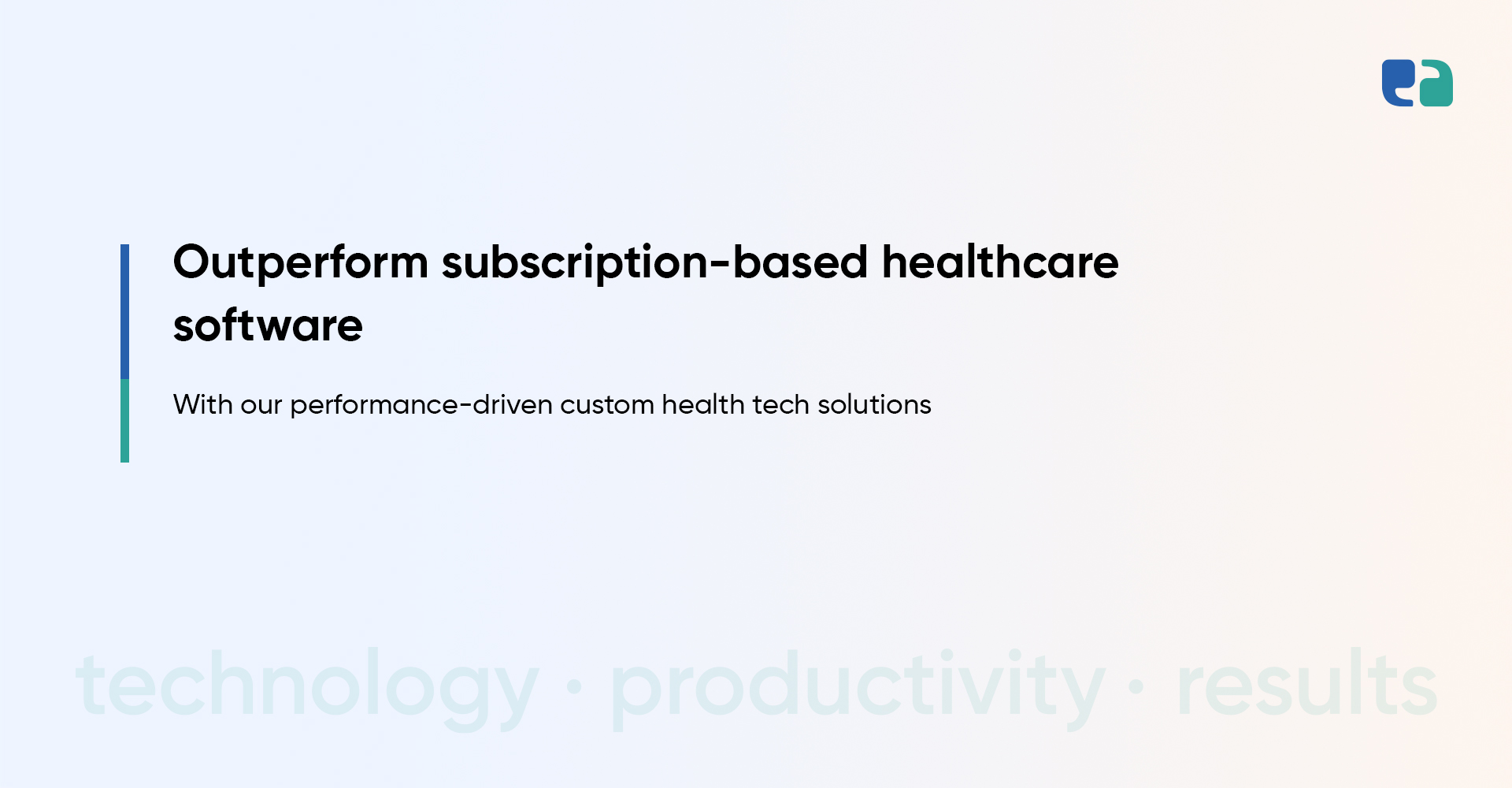The way an Airbus A380 requires Rolls-Royce Trent 900 engines to lift the weight of 1,234,600lb,
A healthcare entity requires robust, cutting-edge, and custom-built healthcare software to achieve operational efficiency and patient satisfaction.
While managing hundreds of tedious and time-consuming clinical and administrative workflows.
Because of this reason, the healthcare software market size in the US has skyrocketed to a whopping USD 167.4 billion in 2022.
It is estimated to reach USD 1,305.1 billion.
The top driving factors of the insanely valuable healthcare software market are:
- Affordable healthcare technologies
- Easy access to local talent
- Government prioritizing digital healthcare
- Constant interest of investors in health tech startups
- Growing complexities of the healthcare system
All this can only be addressed via custom healthcare software development.
But there are several technical, legal, and administrative challenges restricting the true potential of custom-built healthcare software.
These challenges not only limit the possibilities associated with healthcare software but pose a greater risk.
Especially, for the software owner and custom healthcare software development company.
So, to guide you through everything you need to know to build custom healthcare software that will rule the market for at least a decade, we have prepared this guide.
This will solve all of your doubts about technology, business, and compliance.
What is Custom-Built Healthcare Software? How Does It Differ from Healthcare Mobile Apps?
All healthcare entities including hospitals, clinics, labs, nursing homes, and even clinical research sites, have tons of data and hundreds of clinical and administrative processes that rely on each other.
While serving patients without making them wait is their number one priority.
But they usually end up messing up with their priority as they find themselves stuck in chaotic work environments where everything needs to be taken care of manually.
So, to aid clinical and administrative staff in their daily work by streamlining the workflows and automating their tedious tasks, custom-built healthcare software comes to the rescue.
Let’s understand this with an example of healthcare scheduling software.
In the absence of such software, the staff needs to manually receive appointments on call, allocate them time and date after checking the availability of providers, and remind patients of upcoming appointments by making several calls.
Things get more complicated when a patient demands modification in a scheduled appointment.
This entire process ends up with overwhelmed staff, high chances of errors, wastage of resources, and very poor patient care experience.
However, if a hospital deploys scheduling software, the staff can easily schedule appointments by validating availability from a dashboard that is connected to the providers’ EMR/EHR.
The software also automatically reminds patients of their upcoming appointments to reduce no-show-offs.
Here, the software is called custom-built as it is dedicatedly developed for one entity by studying its exact requirements and following the entire software development lifecycle.
Unlike the healthcare app, this custom-built healthcare software opens on a computer or laptop and is majorly used internally within the boundaries of a healthcare entity.
Custom Healthcare Software Development vs Pre-Built Healthcare Software: What Should You Choose?
Lately, we have observed a new trend of acquiring healthcare software on lease!
Yes, in IT business terms, it is called subscription-based software.
Under this subscription-based model, healthcare entities acquire a software usage right by paying a fixed monthly or yearly fee.
The software companies that are selling software usage right under subscription plans build healthcare software that is in demand and sell it to everyone needing it without sharing the software ownership.
Needless to say, this healthcare software is built for everyone while keeping a one-fits-all approach in mind.
Meaning, it is only capable of very general requirements and not any specific requirements of healthcare entities.
Many healthcare entities still acquire pre-built healthcare software to start using it instantly by paying hundreds of dollars.
And it works for them too.
Because you only need custom-built healthcare software when you are serious about your digital transformation and have a long-term vision.
How Does Custom-Built Healthcare Software Solve Age-Old Problems Our Healthcare System Has Been Facing?
Before going for a custom healthcare software development company to build custom healthcare software, you must define the value it will deliver.
In the IT world, the value is always defined by the problems it solves!
Thus, the following are the top age-old problems of our healthcare system that you can solve with custom-built healthcare software.
Custom Healthcare Software Development Process
In case you are planning to build custom healthcare software, you must know what cooks behind the doors of a healthcare IT company or how they build your software.
Because custom medical software development is not just about coding.
Coding is just 20% of the entire process.
The remaining 80% involves a lot of documentation, brainstorming, and testing.
So, for your understanding, let’s share the major phases of the healthcare software development lifecycle.
The Trending Technologies in Custom Healthcare Software Development
Most Popular Healthcare Software in the Healthcare Industry
Primary Challenges in Custom Healthcare Software Development
Healthcare software development is full of complexity as it needs to be performance-driven and secure at the same time.
So, here are the primary challenges in healthcare software development.
Different Aspects of Your Healthcare Software You Must Test Before Launching
Testing is a significant part of the custom healthcare software development process.
It helps you improve the performance, usability, and functionality of the software along with reducing maintenance costs.
So, here are some of the important aspects, you must test before launching the software.



